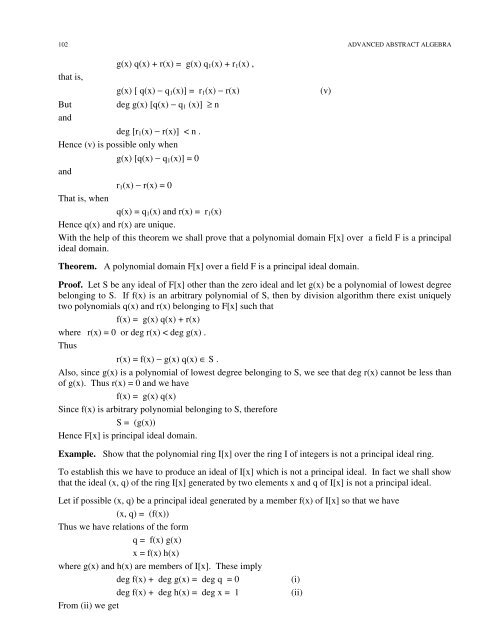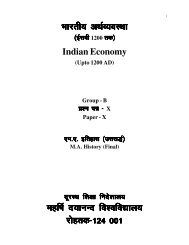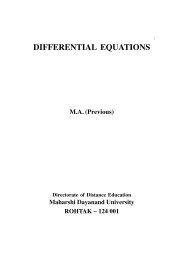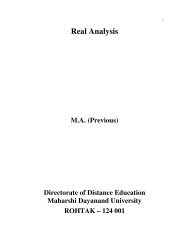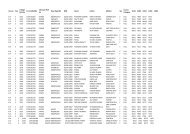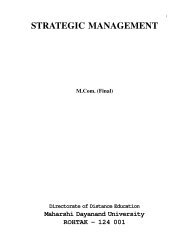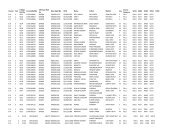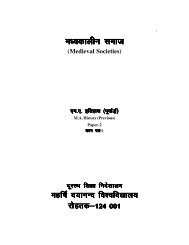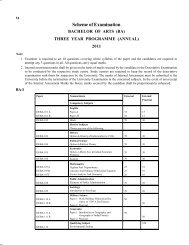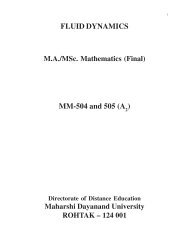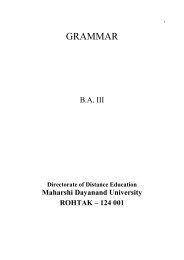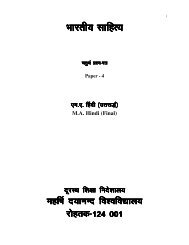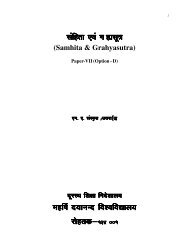Advanced Abstract Algebra - Maharshi Dayanand University, Rohtak
Advanced Abstract Algebra - Maharshi Dayanand University, Rohtak
Advanced Abstract Algebra - Maharshi Dayanand University, Rohtak
Create successful ePaper yourself
Turn your PDF publications into a flip-book with our unique Google optimized e-Paper software.
102<br />
ADVANCED ABSTRACT ALGEBRA<br />
that is,<br />
But<br />
and<br />
g(x) q(x) + r(x) = g(x) q 1 (x) + r 1 (x) ,<br />
g(x) [ q(x) − q 1 (x)] = r 1 (x) − r(x)<br />
deg g(x) [q(x) − q 1 (x)] ≥ n<br />
deg [r 1 (x) − r(x)] < n .<br />
Hence (v) is possible only when<br />
and<br />
g(x) [q(x) − q 1 (x)] = 0<br />
r 1 (x) − r(x) = 0<br />
That is, when<br />
q(x) = q 1 (x) and r(x) = r 1 (x)<br />
Hence q(x) and r(x) are unique.<br />
With the help of this theorem we shall prove that a polynomial domain F[x] over a field F is a principal<br />
ideal domain.<br />
Theorem. A polynomial domain F[x] over a field F is a principal ideal domain.<br />
Proof. Let S be any ideal of F[x] other than the zero ideal and let g(x) be a polynomial of lowest degree<br />
belonging to S. If f(x) is an arbitrary polynomial of S, then by division algorithm there exist uniquely<br />
two polynomials q(x) and r(x) belonging to F[x] such that<br />
f(x) = g(x) q(x) + r(x)<br />
where r(x) = 0 or deg r(x) < deg g(x) .<br />
Thus<br />
r(x) = f(x) − g(x) q(x) ∈ S .<br />
Also, since g(x) is a polynomial of lowest degree belonging to S, we see that deg r(x) cannot be less than<br />
of g(x). Thus r(x) = 0 and we have<br />
f(x) = g(x) q(x)<br />
Since f(x) is arbitrary polynomial belonging to S, therefore<br />
S = (g(x))<br />
Hence F[x] is principal ideal domain.<br />
Example. Show that the polynomial ring I[x] over the ring I of integers is not a principal ideal ring.<br />
To establish this we have to produce an ideal of I[x] which is not a principal ideal. In fact we shall show<br />
that the ideal (x, q) of the ring I[x] generated by two elements x and q of I[x] is not a principal ideal.<br />
Let if possible (x, q) be a principal ideal generated by a member f(x) of I[x] so that we have<br />
(x, q) = (f(x))<br />
Thus we have relations of the form<br />
q = f(x) g(x)<br />
x = f(x) h(x)<br />
where g(x) and h(x) are members of I[x]. These imply<br />
deg f(x) + deg g(x) = deg q = 0<br />
(i)<br />
deg f(x) + deg h(x) = deg x = 1<br />
(ii)<br />
From (ii) we get<br />
(v)


